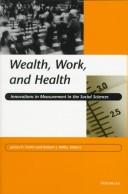| Listing 1 - 10 of 22 | << page >> |
Sort by
|
Book
ISBN: 9780471910138 0471910139 Year: 1987 Publisher: Chichester: Wiley,
Abstract | Keywords | Export | Availability | Bookmark
 Loading...
Loading...Choose an application
- Reference Manager
- EndNote
- RefWorks (Direct export to RefWorks)
Book
Year: 1980 Publisher: Cambridge, Mass. National Bureau of Economic Research
Abstract | Keywords | Export | Availability | Bookmark
 Loading...
Loading...Choose an application
- Reference Manager
- EndNote
- RefWorks (Direct export to RefWorks)
Book
Year: 1979 Publisher: Cambridge, Mass. National Bureau of Economic Research
Abstract | Keywords | Export | Availability | Bookmark
 Loading...
Loading...Choose an application
- Reference Manager
- EndNote
- RefWorks (Direct export to RefWorks)

ISBN: 1567500749 Year: 1994 Publisher: Norwood, NJ : Ablex,
Abstract | Keywords | Export | Availability | Bookmark
 Loading...
Loading...Choose an application
- Reference Manager
- EndNote
- RefWorks (Direct export to RefWorks)
Digital
Year: 2011 Publisher: Cambridge, Mass. National Bureau of Economic Research
Abstract | Keywords | Export | Availability | Bookmark
 Loading...
Loading...Choose an application
- Reference Manager
- EndNote
- RefWorks (Direct export to RefWorks)
This paper characterizes heterogeneity of the beliefs of American households about future stock market returns, provides an explanation for that heterogeneity and establishes its relationship to stock holding behavior. We find substantial belief heterogeneity that is puzzling since households can observe the same publicly available information about the stock market. We propose a simple learning model where agents can invest in the acquisition of financial knowledge. Differential incentives to learn about the returns process can explain heterogeneity in beliefs. We check this explanation by using data on beliefs elicited as subjective probabilities and a rich set of other variables from the Health and Retirement Study. Both descriptive statistics and estimated relevant heterogeneity of the structural parameters provide support for our explanation. People with higher lifetime earnings, higher education, higher cognitive abilities, defined contribution as opposed to defined benefit pension plans, for example, possess beliefs that are considerably closer to what historical time series would imply. Our results also suggest that a substantial part of the reduced form relationship between stock holding and household characteristics is due to differences in beliefs. Our methodological contribution is estimating relevant heterogeneity of structural belief parameters from noisy survey answers to probability questions.
Digital
Year: 2012 Publisher: Cambridge, Mass. National Bureau of Economic Research
Abstract | Keywords | Export | Availability | Bookmark
 Loading...
Loading...Choose an application
- Reference Manager
- EndNote
- RefWorks (Direct export to RefWorks)
Based on subjective survival probability questions in the Health and Retirement Study, we use an econometric model to estimate the determinants of individual-level uncertainty about personal longevity. This model is built around the Modal Response Hypothesis (MRH), a mathematical expression of the idea that survey responses of 0, 50 or 100 percent to probability questions indicate a high level of uncertainty about the relevant probability. We show that subjective survival expectations in 2002 line up very well with realized mortality of the HRS respondents between 2002 and 2010. We show that the MRH model performs better than typically used models in the literature of subjective probabilities. Our model gives more accurate estimates of low probability events and it is able to predict the unusually high fraction of focal 0, 50 and 100 answers observed in many datasets on subjective probabilities.
Book
Year: 1978 Publisher: Los Angeles University of Southern California. Department of economics
Abstract | Keywords | Export | Availability | Bookmark
 Loading...
Loading...Choose an application
- Reference Manager
- EndNote
- RefWorks (Direct export to RefWorks)

ISBN: 0472110268 Year: 1999 Publisher: Ann Arbor : University of Michigan Press,
Abstract | Keywords | Export | Availability | Bookmark
 Loading...
Loading...Choose an application
- Reference Manager
- EndNote
- RefWorks (Direct export to RefWorks)
Social sciences --- Wealth --- Labor --- Health --- Sciences sociales --- Richesse --- Travail --- Santé --- Research --- Congresses --- Recherche --- Congrès --- Congresses. --- Santé --- Congrès
Digital
Year: 2018 Publisher: Cambridge, Mass. National Bureau of Economic Research
Abstract | Keywords | Export | Availability | Bookmark
 Loading...
Loading...Choose an application
- Reference Manager
- EndNote
- RefWorks (Direct export to RefWorks)
Physical and cognitive abilities of older workers decline with age, which can cause a mismatch between abilities and job demands, potentially leading to early retirement. We link longitudinal Health and Retirement Study data to O*NET occupational characteristics to estimate to what extent changes in workers' physical and cognitive resources change their work-limiting health problems, mental health, subjective probabilities of retirement, and labor market status. While we find that physical and cognitive decline strongly predict all outcomes, only the interaction between large-muscle resources and job demands is statistically significant, implying a strong mismatch at older ages in jobs requiring large-muscle strength. The effects of declines in fine motor skills and cognition are not statistically different across differing occupational job demands.
Book
Year: 1978 Publisher: Cambridge, Mass. National Bureau of Economic Research
Abstract | Keywords | Export | Availability | Bookmark
 Loading...
Loading...Choose an application
- Reference Manager
- EndNote
- RefWorks (Direct export to RefWorks)
A structural model of the demand for college attendance is derived from the theory of comparative advantage and recent statistical models of self-selection and unobserved components. Estimates from NBER-Thorndike data strongly support the theory. First, expected lifetime earnings gains influence the decision to attend college. Second, those who did not attend college would have earned less than measurably similar people who did attend, while those who attended college would have earned less as high school graduates than measurably similar people who stopped after high school. Positive selection in both groups implies no "ability bias in these data.
College graduates --- Education --- Employment. --- Economic aspects.
| Listing 1 - 10 of 22 | << page >> |
Sort by
|

 Search
Search Feedback
Feedback About UniCat
About UniCat  Help
Help News
News